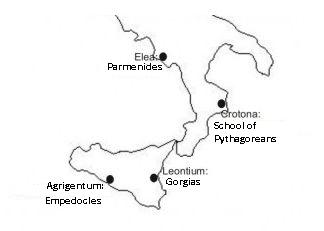Heraclitus of Ephesus (~ 500 BC)
This thinker represents one more step in the progress from religion to philosophy. In many ways, he seems more advanced than the rest. However, this can't be stated as a fact due to lack of proof.
There are more than 100 Fragments by Heraclitus, which allow us to have a better picture of his way of thinking.
His philosophy, on the other hand, continues developing the idea -already present in pre-philosophical religions- of the struggle between two opposite powers (‘CHAOS’ and ‘ORDER’). His thoughts are as follows:
- Anti-thesis between experience and reason:
- Constant flow of things and the knowing subject
- Demand of 'reason': notion of the Divine one
- Conciliation of anti-thesis:
- Knowledge value and difficulty
- The state of true knowledge: faith.
- The path towards wisdom: know yourself.
- The identity of the One eternal (FIRE) and universal evolution
- The reality of the being as a display of opposites and harmony between contraries (dialectic)
- WAR; father and king of all things.
As you can see, Heraclitus also keeps concepts which come from ancient eastern religions. He was also interested in the universal union; that which was previously called arche and he calls ‘divine one’.
He identifies it with 'fire'. It is not with fire as a physical element, but more as a symbol in the sense of war, of a fight between opposing tendencies / ‘CHAOS’ and ‘ORDER’, of course).
As a matter of fact, for him, universal unity lies precisely in that eternal change which confuses our senses. He agrees with Thales of Miletus and his idea of ‘universal flow’ (“Everything changes, nothing remains“).
